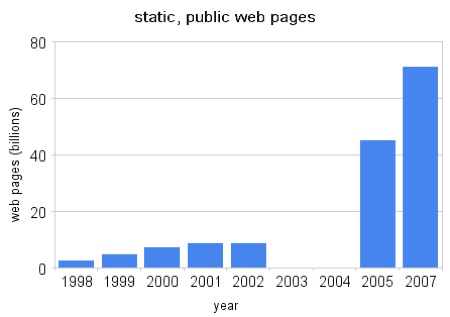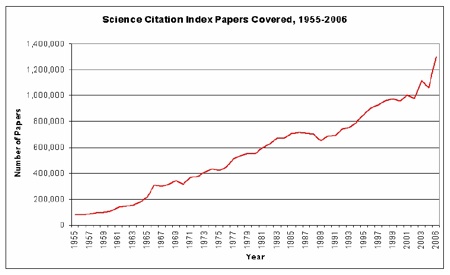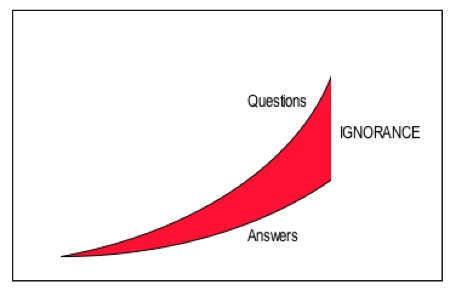The Expansion of Ignorance
[Translations: Traditional Chinese, Dutch, Japanese, Spanish]
The fastest growing entity today is information. Information is expanding ten times faster than the growth of any other manufactured or natural product on this planet. According to a calculation Hal Varian, an economist at Google, and I made, world-wide information has been increasing at the rate of 66% per year for many decades. Compare that explosion to the rate of increase in even the most prolific manufactured stuff – like concrete, or paper — which averages only 7% annually over decades.

We see the expansion of information everywhere. Less visible, harder to track, but exploding the same is the expanision of knowledge. The number of scientific articles published each year has been increasing in a steady rise for more than 50 years. Over the last 150 years the number of patent applications has increased. By this rough metric, knowledge is growing exponentially.


If knowlegde is growing exponentially we should be quickly running out of puzzles. Because of our accelerating rate of learning, a few writers declared we must be in the age of “the end of science.” This stance is hard to maintain for more than nano-second in view the current state-of-belief in physics: that 96% of all matter and energy in our universe is some unknown variety we call dark. It is clear that “dark” is a euphemism for ignorance. We really have no idea what the bulk of the universe is made of. We find a similar state of ignorance if we probe deeply into the cell, the brain, or even the earth. We don’t know nothin’.
Yet it is also clear that we know vastly more about the universe than we did a century ago. This new knowledge has been put to practical use in such consumer goods as GPS and iPods, and a steady increase in our own lifespans. Our beneficial progress in knowledge comes from tools and technology. Telescopes, microscopes, fluoroscopes, oscilloscopes for instance, allow us to see in new ways, and when we looked with new tools, we suddenly win many new answers.
Yet the paradox of science is that every answer breeds at least two new questions. More answers, more questions. Telescopes and microscopes expanded not only what we knew, but what we didn’t know. They allowed us to spy into our ignorance. New and better tools permit us new and better questions. All our knowledge about subatomic particles derived from the new questions generated after we invented an atom smasher.

Thus even though our knowledge is expanding exponentially, our questions are expanding exponentially faster. And as mathematicians will tell you, the widening gap between two exponential curves is itself an exponential curve. That gap between questions and answers is our ignorance, and it is growing exponentialy. In other words, science is a method that chiefly expands our ignorance rather than our knowledge.
We have no reason to expect this to reverse in the future. The more disruptive a technology and tool is, the more disruptive the questions it will breed. We can expect future technologies such as artificial intelligence, controlled fusion, and quantum computing (to name a few on the near horizon) to unleash a barrage of thousands of new huge questions – questions we could have never even thought to ask before. In fact, it’s a safe bet that we have not asked our biggest questions yet.
Or, to put it another way, we have not yet reached our maximum ignorance.


